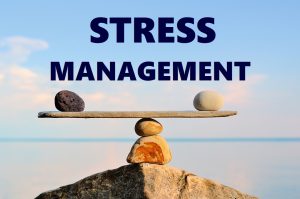Understanding Stress
Stress is a natural response to life’s challenges, but when unchecked, it can have serious consequences for both physical and mental health. Stress is the body’s way of responding to external pressure—whether it’s work deadlines, family responsibilities, or financial concerns. While small doses of stress can be motivating, chronic stress negatively impacts your overall well-being. Prolonged stress may lead to anxiety, depression, or physical ailments like high blood pressure and a weakened immune system. By understanding the root causes of stress, you can begin identifying triggers and take proactive measures to mitigate its effects.
Mindfulness and Meditation
Mindfulness and meditation are powerful tools for stress management. Mindfulness involves staying present and fully engaged in the moment without judgment, while meditation focuses on deep relaxation by centering your thoughts. Both techniques help quiet the mind and reduce stress levels. Mindfulness practices like body scanning or focusing on your breath allow you to release tension and realign your perspective. Meditation, whether guided or unguided, can lower your heart rate, reduce cortisol levels, and train your brain to handle stressful situations more calmly. Making these practices a daily habit, even for just 10–15 minutes, can yield significant improvements in your mental health.
Physical Activity
Regular exercise is one of the most effective ways to combat stress. Physical activity releases endorphins—chemicals in the brain that act as natural mood lifters. Whether it’s a brisk walk, yoga, swimming, or high-intensity training, exercise provides an outlet for built-up tension. Beyond its immediate effects, exercise also promotes better sleep, boosts overall energy levels, and improves self-confidence, all of which contribute to stress reduction. The key is consistency; aim for at least 30 minutes of activity most days of the week to reap its stress-busting benefits. Importantly, choose workouts that you enjoy to keep your routine sustainable.
Healthy Diet
Your diet plays a crucial role in how your body handles stress. Foods rich in nutrients like omega-3 fatty acids, magnesium, and antioxidants help regulate mood and reduce anxiety. Complex carbohydrates such as whole grains promote a steady release of energy, countering the fatigue and irritability often associated with stress. On the other hand, high sugar, caffeine, and processed food intake can exacerbate stress and make you feel sluggish. Incorporating more fruits, vegetables, lean proteins, and healthy fats into your meals supports brain function and boosts mental resilience. Hydration also matters, as even mild dehydration can cause fatigue and irritability, which contribute to stress.
Time Management
Time management is crucial for reducing stress and increasing productivity. Poor time management often results in a constant feeling of being rushed, unproductive, or overwhelmed, which can exacerbate stress. Setting clear priorities, using to-do lists, and breaking tasks into manageable steps can make a difference. Tools like planners or digital apps help keep track of deadlines and allocate specific times for work, relaxation, and self-care. Learning to say no to tasks that don’t align with your goals allows you to focus on what truly matters. By managing your time effectively, you can reduce the stress associated with procrastination and over-commitment.
Social Connections
Humans are inherently social creatures, making meaningful social connections essential for emotional well-being. Strong relationships with friends, family, or coworkers provide a valuable support system, especially during challenging times. A kind word, a shared laugh, or a comforting presence can make stressful moments more bearable. Taking the time to nurture personal relationships not only deepens emotional bonds but also acts as a buffer against loneliness—a significant contributor to stress. If in-person connections aren’t possible, virtual meet-ups or even a heartfelt text can go a long way in maintaining these ties. The key is to choose relationships that uplift and support you.
Sleep Hygiene
Sleep is the foundation of both physical and mental health, and chronic stress often wreaks havoc on your sleep quality. Establishing healthy sleep habits—or good sleep hygiene—is essential for stress management. Prioritize a consistent sleep schedule, going to bed and waking up at the same time each day. Create a calm bedtime routine, free from stimulating activities like scrolling through social media or watching TV. A relaxing activity, such as reading or meditating, can help signal to your body that it’s time to wind down. Make your bedroom conducive to restful sleep by ensuring it’s dark, quiet, and cool. Quality sleep restores both your mind and body, reducing your ability to get stressed in the first place.
Relaxation Techniques
Relaxation techniques provide immediate relief by calming both your body and mind. Deep breathing exercises, such as the 4-7-8 method, help manage your heart rate and reduce physical tension. Progressive muscle relaxation involves tightening and then releasing muscle groups, promoting physical relaxation and reducing stress. Visualization, or guided imagery, is another effective approach that transports you to a calming environment through mental focus. Practicing these techniques regularly not only reduces stress but also builds your ability to remain calm during high-pressure situations. Try incorporating relaxation exercises into your daily routine for long-term benefits.
Setting Boundaries
Setting boundaries is crucial for protecting your well-being and preventing burnout. Whether it’s in personal relationships or at work, saying no to requests that drain your time and energy is an act of self-care. Healthy boundaries help you maintain balance, ensuring you don’t overcommit or neglect your needs. Communicating your limits respectfully but firmly can reduce the stress caused by overextending yourself. For example, you might designate specific “unavailable” hours each evening to disconnect from work emails and focus on relaxation. Remember, setting boundaries is a sign of strength and self-respect that benefits you and those around you.
Seeking Professional Help
Sometimes, stress can feel overwhelming despite your best efforts to manage it. Seeking professional help is not a sign of weakness—it’s a step toward regaining control of your mental health. Therapists, counselors, and psychologists are trained to provide strategies and techniques tailored to your specific needs. They can help you uncover deep-rooted causes of stress and develop coping mechanisms to address them effectively. Stress that manifests as anxiety, depression, or physical symptoms like chronic headaches should not go ignored. Reaching out to a professional can provide relief and ensure you’re equipped to tackle life’s challenges in a healthier way.
FAQ
Q: How long does it take to see improvements from stress management techniques?
A: Results vary depending on the techniques used and individual circumstances. Some methods, like deep breathing, provide immediate relief, while others, such as regular exercise or meditation, may take weeks to show noticeable results. Consistency is key.
Q: Can stress impact physical health?
A: Yes. Chronic stress can lead to a weakened immune system, high blood pressure, weight gain, and even serious conditions like heart disease. Managing stress is vital for overall health.
Q: What’s a quick way to reduce stress at work?
A: Taking short breaks to stretch, practicing deep breathing exercises, or stepping outside for fresh air can quickly calm your mind and reduce workplace stress.
Q: Are there apps available to help manage stress?
A: Yes. Apps like Calm, Headspace, and Insight Timer offer guided meditations, breathing exercises, and sleep aids to help you manage stress from anywhere.
Q: When should I seek professional help for stress?
A: Consider seeking help if stress severely affects your daily life, relationships, or physical health. A professional can guide you toward effective solutions.




